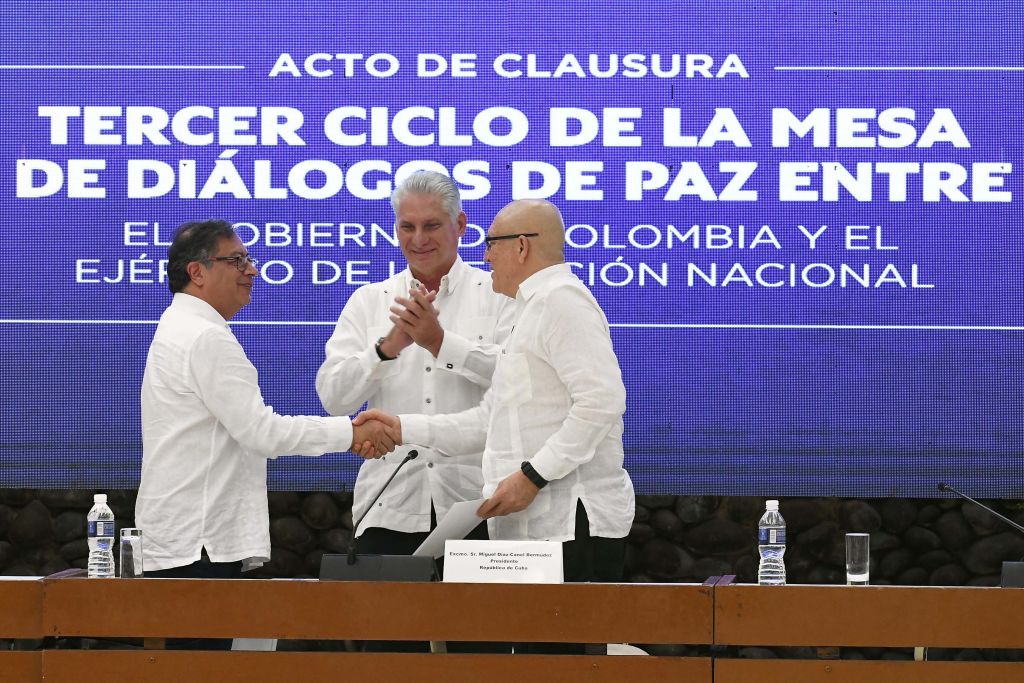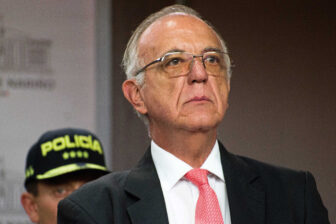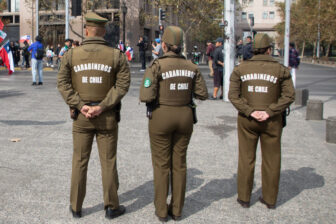BOGOTÁ — On June 9, the Colombian government and a longstanding guerrilla group, the National Liberation Army (ELN), agreed to a six-month nationwide bilateral ceasefire, monitored by international guarantors, the Catholic Church and civil society. This agreement has been hailed as historic, and rightly so. It’s a big step forward in negotiations with the ELN. But there are ample reasons for skepticism over the potential success of the process, including the ELN’s history of poorly timed acts of political violence and terrorism.
The forthcoming ceasefire, a pillar of President Gustavo Petro’s “Total Peace” security initiative, will require the parties to develop and approve protocols before they are implemented on the ground by military commanders on August 3. But beyond this requirement, the government and the ELN must address the following topics if they want the ceasefire to hold and the peace negotiations to succeed.
Communication breakdown
The deal has come at a delicate moment for Petro’s government, as a scandal involving former aides continues to throw up obstacles to his reform agenda, weighing on Petro’s approval rating, which was measured recently at 31%. Homicide rates, having decreased or held stable for decades, have ticked up slightly in recent years (though 2022 saw a slight drop), and the public is eager to see further progress on negotiations with armed groups.
Yet both Petro’s government and the ELN seem to be bad at communicating—both publicly and among themselves. The government’s communication missteps and occasionally indulgent position toward the ELN have created skepticism and uncertainty about the negotiation process. At the same time, the ELN’s wanton disregard for the public’s disapproval of their violent practices threatens their ability to gain public approval for an eventual deal.
On December 31, while most Colombians were off celebrating the New Year, Petro announced a six-month bilateral ceasefire with the ELN, only for the group to deny any such agreement on January 2. Recently, Petro announced that he aims to finalize the agreement with the ELN by May 2025—but he was rebuffed by ELN commanders, who refuse to be pigeon-holed with an end date. The government has rightly raised concerns about the ELN’s lack of unified command, which has made the group react to government announcements by refusing to sit down to negotiate until the government acknowledges their command.
For its part, the ELN has communicated its willingness to reach a peace deal by refusing to renounce the practices of kidnapping and extortion, by threatening journalists on Twitter and by continuing their violent actions against security forces, infrastructure targets and local communities. The ELN has been adamant that they are negotiating a separate agreement to the one the FARC signed and therefore they ought to be treated differently. But they seem to ignore the fact that the FARC have had to perform significant public acts of forgiveness with victims of their many crimes, including rape, extortion, forced recruitment and kidnapping.
A continued toll of violence
Just days after the ELN announced a ceasefire, they were credited with two separate kidnappings, one in Cauca and the other in Arauca. The ELN’s involvement in violence further diminishes public confidence in the group and the process. The ELN has a presence in 212 municipalities across 22 departments, and it has the capacity and intent to target critical infrastructure and government targets, often with civilian collateral damage. In fact, some of its attacks have been responsible for ending previous peace talks, like the terrorist attack on Escuela General Santander in January 2019, where 22 police cadets were killed.
What’s more, striking a ceasefire agreement solely with the ELN leaves room for other armed groups to continue causing harm. The ELN is only one part of the “Total Peace” equation, and other groups, such as the Clan del Golfo and FARC dissidents, will likely continue to fight over territorial control. Violence could break out between the groups, harming civilians and threatening a breakdown of the ceasefire.
The success of the ELN ceasefire will determine the trajectory of the government’s peace programs and its ability to confront armed actors in rural areas. Failure to maintain it could erode public support and further embolden other armed groups to strike government targets in order to get better negotiating conditions later on. The absence of a heavy-handed response by the government to violent attacks will highlight the government’s perceived weakness in responding to violence with force.
Political resolve is needed
Peace has arguably always been on the ballot in Colombia. Voters have either approved or rejected talks, agreements and offers of leniency towards insurgent groups, either directly in referenda, or through presidential and local elections. A recent poll by Invamer, a local pollster, suggests that 55% of those surveyed support continuing negotiations with the ELN, but 63% believe that the Petro Government’s Total Peace project is on the wrong track.
Colombians generally support negotiations with the ELN, but an unfavorable agreement could sway public opinion against the government, an element that could dictate the outcomes of the local elections in October.
The ELN’s hardline negotiating position and the government’s insistence on achieving peace at any cost gives the ELN a lot of leverage over negotiations. The ELN is not bound by election timelines, the length of presidential terms or bans on standing for reelection, as is Petro. Its recent demands include the eventual release of all ELN prisoners as part of the peace agreement, political participation in Congress, proposals to change the country’s economic model, as well as calls for subsidies for the ELN not to conduct kidnappings and extortions—and for a Constitutional Assembly to take place. Many of these items would not be likely to gain broad public approval.
Neither local public opinion, international partners or the International Criminal Court will favor an agreement with the ELN that bypasses standards stipulating truth, justice, reparation and non-repetition already in place in Colombia. Insistence on peace at any cost and excessive leniency towards the ELN puts Petro’s credibility at stake. The ceasefire will likely temporarily halt violent actions, but lasting peace is likely to remain distant in Colombia.
—
Guzmán is the director of Colombia Risk Analysis, a political risk consulting firm based in Bogotá.








